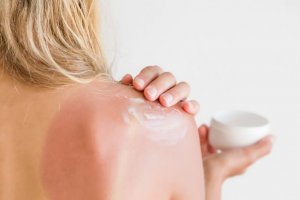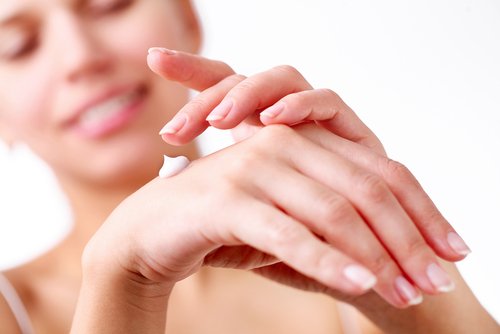After Sun Lotion or Moisturizer: Which is Best?


Reviewed and approved by the doctor Karla Henríquez
Summer activities can be fun for you and your friends, but harsh environmental conditions could damage your skin. The sun, sand, salt water, and chlorine directly affect your skin after sunbathing at the beach or the pool. All this begs the question: Should you use after sun lotion or moisturizer?
We all know that wide-spectrum sunscreen is the best lotion to apply before and during exposure to UV rays. However, what should you do once the sun-loaded fun day comes to an end?
You’ll need to apply after sun lotion or another kind of moisturizer. Read on to find out the characteristics of each one.
After Sun Lotion and Moisturizer: Similarities and Differences
After sun lotions and moisturizers are both great sources of skin hydration. Moisturizing and after sun lotions also both relieve discomfort and prevent premature aging.
Discover: What You Need to Know About Vitamin C Skin Products
What’s in After Sun Lotion?
Sun lotion contains moisturizing substances known as humectants. It also contains active ingredients with soothing properties such as aloe vera, calendula, etc. Its composition may include mint, vitamins, and antioxidants.
The composition of after sun lotions vary according to their preparation. They often include a number of active ingredients with specific benefits for skin that has been exposed to solar radiation.
Some of them are:
Mint
Mint helps the skin recover naturally and relieves irritation. It’s very refreshing because it reduces body heat and reduces inflammation of the skin tissue.

Aloe Vera
Certainly, this is one of the most popular plants used for skin care. Aloe moisturizes and repairs cell tissue while providing vitamins that nourish the dermis.
Its topical use also serves as an analgesic, so it acts as a soothing agent of the sun’s affected epidermis tissues.
Alpha-bisabolol
This compound comes from chamomile. Due to its anti-inflammatory properties, there are many masks and home remedies for the treatment of burns made with it.
D-panthenol
It is a derivative of vitamin B5 (pantothenic acid). Furthermore, it promotes the formation of new tissues and regenerates skin.
Calendula Extract
This extract soothes and heals. In addition, it helps to recover from damage caused by UV rays. It’s also one of the most widely used ingredients in the preparation of after sun lotions.
Other Common Ingredients
Furthermore, other active components that are frequently found in after sun lotions that promote the recovery and regeneration of dead skin cells are:
- Menthol
- Camphor
- Sage
- Allantoin
- Enoxolone
- Tyrosine
What’s in Moisturizers?
First, the ingredients of a moisturizer can vary. It depends on what kind of product you want to use to hydrate your skin, because this lotion should be applied to your skin as often as possible.
For example, there are many varieties and fragrances and some of its most common ingredients are:
- Aloe vera
- Almonds
- D-Panthenol
- Essential oils
- Shea butter
- Coconut milk
Read more: Easy-to-Make Rejuvenation Aloe Cream
Which Should I Choose?

Some moisturizers contain the same active ingredients used in after sun lotion. Their fragrance is usually mild, and neutral and they’re excellent allies in the nourishing of your skin. They’ll soothe and hydrate you well after sun exposure during a hot day. In addition, you may place the product in the fridge for a few seconds to intensify its cooling sensation.
However, if you were under the sun for a long period of time and your skin is badly burnt, we recommend using after sun lotion. After all, this product has specific components to reduce inflammation and relieve the burning. Moisturizers, on the other hand, don’t have these.
Above all, remember that you must stay well hydrated both outside and inside. Drink more water than you would on a normal day: you will feel better and relieve the exhaustion acquired during a sunny day.
After a long day outdoors, do a thorough skin cleansing. Often, sunscreens combined with sweat can be harsh on it. Keep in mind that you shouldn’t exfoliate immediately after sunbathing, as your skin will be very sensitive.
All cited sources were thoroughly reviewed by our team to ensure their quality, reliability, currency, and validity. The bibliography of this article was considered reliable and of academic or scientific accuracy.
- Krauthammer, M., Kong, Y., Ha, B. H., Evans, P., Bacchiocchi, A., McCusker, J. P., … Halaban, R. (2012). Exome sequencing identifies recurrent somatic RAC1 mutations in melanoma. Nature Genetics. https://doi.org/10.1038/ng.2359
- Sarkany, R. (2017). Sun protection strategies. Medicine (United Kingdom). https://doi.org/10.1016/j.mpmed.2017.04.009
- Schauder, S. (2003). Sun protection. Tagliche Praxis. https://doi.org/10.1016/S0891-5245(07)80011-3
- Stanton, W. R., Janda, M., Baade, P. D., & Anderson, P. (2004). Primary prevention of skin cancer: A review of sun protection in Australia and internationally. Health Promotion International. https://doi.org/10.1093/heapro/dah310
- Hornung, R. L. (2011). Photoprotection. In Harper’s Textbook of Pediatric Dermatology: Third Edition. https://doi.org/10.1002/9781444345384.ch108
This text is provided for informational purposes only and does not replace consultation with a professional. If in doubt, consult your specialist.








